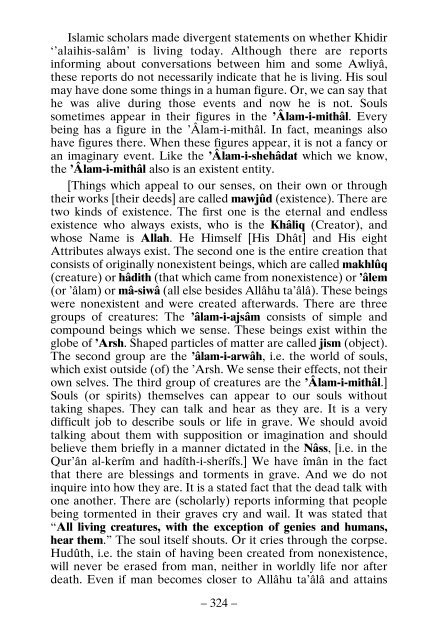O Son !
THE BOOK ‘O SON’ Al-hamdu lillâhi Rabbil ’âlamîn. Wa-s-salâtu wa-s-salâmu ’alâ Rasûlinâ Muhammadin wa Âlihi wa Sahbihi ajma’în. 1– O son! Collecting from books written by the scholars of the Hanafî Madhhab three hundred and sixty hadîth-i-sherîfs and forty-four khabars and also the seven essentials and the five rukns and the seven wâjibs and the fourteen sunnats and the twenty-five mustahabs and the fourteen mufsids of namâz, I have explained them for you. Adapt your acts and deeds to these teachings so that you attain fayz and nejât (salvation)! 2– Also for your information, I have collected a thousand and ninety âdâb (adabs) for you and for other young Muslims like you. If you adapt your actions and acts of worship to these teachings, they will be sufficient for you. If you laze, disobey Allâhu ta’âlâ and cease from these practices and manners, you will be afflicted with slavery and disgrace in the world and subjected to torment in the world to come. If you live up to them and advise your Muslim brothers to do the same, it will be useful for you. They will say blessings over you. And Haqq ta’âlâ will accept their invocations. For, a slave will be pardoned on account of another slave’s invocations for them.
THE BOOK ‘O SON’
Al-hamdu lillâhi Rabbil ’âlamîn. Wa-s-salâtu wa-s-salâmu ’alâ
Rasûlinâ Muhammadin wa Âlihi wa Sahbihi ajma’în.
1– O son! Collecting from books written by the scholars of the
Hanafî Madhhab three hundred and sixty hadîth-i-sherîfs and
forty-four khabars and also the seven essentials and the five rukns
and the seven wâjibs and the fourteen sunnats and the twenty-five
mustahabs and the fourteen mufsids of namâz, I have explained
them for you. Adapt your acts and deeds to these teachings so that
you attain fayz and nejât (salvation)!
2– Also for your information, I have collected a thousand and
ninety âdâb (adabs) for you and for other young Muslims like you.
If you adapt your actions and acts of worship to these teachings,
they will be sufficient for you. If you laze, disobey Allâhu ta’âlâ
and cease from these practices and manners, you will be afflicted
with slavery and disgrace in the world and subjected to torment in
the world to come.
If you live up to them and advise your Muslim brothers to do
the same, it will be useful for you. They will say blessings over you.
And Haqq ta’âlâ will accept their invocations. For, a slave will be
pardoned on account of another slave’s invocations for them.
Create successful ePaper yourself
Turn your PDF publications into a flip-book with our unique Google optimized e-Paper software.
Islamic scholars made divergent statements on whether Khidir<br />
‘’alaihis-salâm’ is living today. Although there are reports<br />
informing about conversations between him and some Awliyâ,<br />
these reports do not necessarily indicate that he is living. His soul<br />
may have done some things in a human figure. Or, we can say that<br />
he was alive during those events and now he is not. Souls<br />
sometimes appear in their figures in the ’Âlam-i-mithâl. Every<br />
being has a figure in the ’Âlam-i-mithâl. In fact, meanings also<br />
have figures there. When these figures appear, it is not a fancy or<br />
an imaginary event. Like the ’Âlam-i-shehâdat which we know,<br />
the ’Âlam-i-mithâl also is an existent entity.<br />
[Things which appeal to our senses, on their own or through<br />
their works [their deeds] are called mawjûd (existence). There are<br />
two kinds of existence. The first one is the eternal and endless<br />
existence who always exists, who is the Khâliq (Creator), and<br />
whose Name is Allah. He Himself [His Dhât] and His eight<br />
Attributes always exist. The second one is the entire creation that<br />
consists of originally nonexistent beings, which are called makhlûq<br />
(creature) or hâdith (that which came from nonexistence) or ’âlem<br />
(or ’âlam) or mâ-siwâ (all else besides Allâhu ta’âlâ). These beings<br />
were nonexistent and were created afterwards. There are three<br />
groups of creatures: The ’âlam-i-ajsâm consists of simple and<br />
compound beings which we sense. These beings exist within the<br />
globe of ’Arsh. Shaped particles of matter are called jism (object).<br />
The second group are the ’âlam-i-arwâh, i.e. the world of souls,<br />
which exist outside (of) the ’Arsh. We sense their effects, not their<br />
own selves. The third group of creatures are the ’Âlam-i-mithâl.]<br />
Souls (or spirits) themselves can appear to our souls without<br />
taking shapes. They can talk and hear as they are. It is a very<br />
difficult job to describe souls or life in grave. We should avoid<br />
talking about them with supposition or imagination and should<br />
believe them briefly in a manner dictated in the Nâss, [i.e. in the<br />
Qur’ân al-kerîm and hadîth-i-sherîfs.] We have îmân in the fact<br />
that there are blessings and torments in grave. And we do not<br />
inquire into how they are. It is a stated fact that the dead talk with<br />
one another. There are (scholarly) reports informing that people<br />
being tormented in their graves cry and wail. It was stated that<br />
“All living creatures, with the exception of genies and humans,<br />
hear them.” The soul itself shouts. Or it cries through the corpse.<br />
Hudûth, i.e. the stain of having been created from nonexistence,<br />
will never be erased from man, neither in worldly life nor after<br />
death. Even if man becomes closer to Allâhu ta’âlâ and attains<br />
– 324 –

















